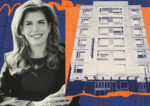After assailing Council member Julie Menin’s bill requiring hotels to get licenses, the hotel industry has proposed a compromise.
The American Hotel & Lodging Association drafted a bill that would require hotel operators to obtain licenses and, in many cases, change the way they operate.
Notably, the industry’s proposal does not include the most controversial provisions from Menin’s Safe Hotels Act: staffing mandates that would require hotel owners to employ all of their core staff directly, effectively preventing them from using subcontractors for cleaning, maintenance and other tasks.
“Our proposal removes the costly and burdensome operational mandate that will eliminate the subcontractor position for thousands of hard working New Yorkers and has absolutely no bearing on health and safety standards,” interim AHLA president and CEO Kevin Carey said in a letter it sent to Menin along with the proposed bill.
Menin has hailed her bill as a way to crack down on crime in hotels. But instead it has pitted union members against subcontractors. The Hotel and Gaming Trades Council, the primary union representing hotel workers in the city, is behind Menin’s bill, which the hotel industry views as a back-door attempt at unionization and a scheme to make nonunion hotels less competitive.
A spokesperson for the union assailed the trade group’s proposal.
“This is from a DC-based organization that has nothing to do with New York City, and aside from making inflammatory press statements, has had no productive role in ongoing discussions around this bill,” said the spokesperson. “It’s no surprise that the AHLA would like to gut key worker protections such as requirements around staffing levels and direct employment.”
The national trade group does not typically get involved in City Council legislation. Its initial response to the Safe Hotels Act seemed to surprise Menin, who calls her bill a work in progress.
“We continue to meet and take feedback to craft a bill that addresses the issues,” she said. “We review input from all parties and are committed to passing a bill which meets its core objectives of protecting guests, workers and neighbors.”
Under her legislation, hotel operators would have to meet certain requirements to get a license from the city Department of Consumer and Worker Protection. Unlicensed hotels would have to close.
After a backlash from the industry, Menin added provisions to spare hotel restaurants, bars and nightclubs; eliminate staffing ratios; and clarify the definition of ownership to include real estate investment trusts.
The hotel industry said her changes were not enough and that the bill has created uncertainty, making it hard to buy and sell hotels.
The industry’s bill has many of the same provisions as Menin’s including panic buttons in every hotel room, human trafficking training for all staff (which the AHLA says is already required by state legislation) and various safety and cleanliness requirements.
It calls for licenses to be renewed every five years instead of the two proposed by Menin.
“The original version … contains sweeping measures that would force small businesses to close, could shutter many hotels and has already created a chilling effect on hotel-related financial transactions in New York City,” Carey said. “We believe that this proposed legislation eases many of those adverse impacts.”
This article has been updated with a statement from the hotel workers union.
Read more



